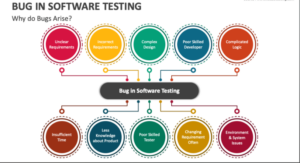Types of mobile application testing:
- Functional Mobile Application Testing: It confirms that the application is working as per the requirements. Most of the tests conducted are to check user interface and call flow. The functional behaviour of the different features of mobile applications are tested to check their expected behaviour.
- Laboratory Testing: This type of testing is done by network carriers and for simulating the complete wireless networks. This test is used to find any errors when mobile application uses voice or data for its functions.
- Performance Testing: This test is done to check the performance of the application such as bad network, low coverage, low memory. Performance can be affected from two sides, that is, either from application server side and client server side.
- Memory leakage testing: It happens when mobile application is unable to manage the memory. The memory allocated during the execution of program is not released due to incorrect programming. This results in poor performance and slows down of the system.
- Interruption testing: The mobile application may functions face some interruptions like incoming calls and network coverage outage and recovery. In interruption testing, the ability of the application to handle the interruption is tested
- Usability testing: Usability is done to check whether the application is achieving its goals and is getting favourable responses from the user. The mobile application is expected to be user friendly.
- Installation testing: This testing is done to verify that any installation of the application in the device goes smoothly without any difficulty.
- Certification testing: To get certificate every mobile device has to be tested with different platforms.
- Black box testing: The tester tests the functionality of the application without knowing the internal coding logic of the application.
Questions
- Explain any other types of mobile testing?
- What are the advantages of mobile testing?
- How different is the mobile testing from other testing?






























16 Responses
Other types of mobile testing are …Load Testing, Volume Testing, Stress Testing, Soak Testing,Monkey Testing
Benifit:
One of the most important reason why we need this testing for mobile applications provides various test solutions, which help you to verify and validate the overall functioning of the mobile apps.
1.Other types of mobile testing are …Load Testing, Volume Testing, Stress Testing, Soak Testing, Scalability Testing, Risk Based Testing, Penetration Testing, Pair Testing, Negative Testing, Mutation Testing, Monkey Testing, Key Word Driven Testing, Happy Testing, End to End Testing.
2.Advantages of Mobile testing are :
a.To check the functionality, usability, security, compatibility of application
b. increases the efficiency, quality and reliability of the application
3.Mobile testing different from other testing because testing done on variety of software and hardware platforms and different network connectivity
1) Types of mobile application testing:
a. Functional Mobile Application Testing: It confirms that the application is working as per the requirements.
b. Performance Testing: This test is done to check the performance of the application such as bad network, low coverage, low memory.
c. Memory leakage testing: If the memory allocated during program execution is not released it results in slow running application and affects the performance of the system.
d. Usability testing: To check whether application is user friendly.
e. Interruption testing: The mobile application may functions face some interruptions like incoming calls and network coverage outage and recovery.
2) The core objective of testing a mobile app is to check its behavior across various devices and thereby increases the performance and efficiency of the app.
It checks the functionality and usability of the application.
Checks the compatibility of application.
Increases the quality,efficiency and reliability of the application
3) Mobile testing or mobile application testing is a process in which the application software developed for mobile is tested for the functionality, usability and consistency
Here the app must be tested over different combinations of platforms, operating system and networks.
Explain any other types of mobile testing?
Other types of mobile testing are:
– Load Testing- test the performance of the software with diff. no. of users
– Volume Testing-test the performance of the software with different volumes of data
– Stress Testing- test the performance of the software with different no. of resources
– Soak Testing- test the performance of the software under continuous usage.
What are the advantages of mobile testing?
Advantages of mobile testing, it ensures long term success, the app is tested over
different combinations of platforms, operating system, and networks, to test the
functionality, usability, and consistency before launching to global.
How different is the mobile testing from other testing?
Mobile testing is different than other testing because it is done to test the functionality, usability, and consistency, not just the web page.
To ensure long term success, the app is tested over different combinations of
platforms, operating system and networks before launching to global.
1.Explain any other types of mobile testing?
Other types of mobile testing are …Load Testing, Volume Testing, Stress Testing, Soak Testing, Scalability Testing, Risk Based Testing, Penetration Testing, Pair Testing, Negative Testing, Mutation Testing, Monkey Testing, Key Word Driven Testing, Happy Testing, End to End Testing, Bluetooth Testing, Wi-Fi Testing, Recovery Testing, Database Testing, Network Connections Testing.
2.What are the advantages of mobile testing?
Advantages of Mobile testing are :
a. To check the functionality, usability, security, compatibility of application
b. increases the efficiency, quality and reliability of the application.
3.How different is the mobile testing from other testing?
Mobile testing different from other testing because testing done on variety of software and hardware platforms and different network connectivity
1.smoke testing,functional testing, sanity testing, retesting, regresstion testing, exploratory testing, performance testing, browser compatibility testing, cross browser testing, external / internal system testing, security testing,
2.There are different mobile operating systems in the market like android, windows. The hardware configurations, features, user interface, operability of mobile devices are different. It is difficult to test the single application over multiple devices running on the same platform.
3. Any applications developed must be available in any platform.This type of testing is done by network carriers and for simulating the complete wireless networks.
1. Explain any other types of mobile testing?
a. Compatibility testing
b. Security testing
c. Localization testing
d. System testing
e. Recovery testing
f. Mobile device testing
g. Storage testing
h. Regression testing
i. Reliability testing
2. What are the advantages of mobile testing?
Reduced overall testing time,ease of automated testing,cross platform testing,test hardware accessibility,perform quality
assurance tests and organized ticket generation.
3. How different is the mobile testing from other testing?
This mobile testing has to simulaneously deal with user interface and call flow. This has to undergo testing with
different hardware interfaces. Network coverage outage and recovery are also to be noted. Certification testing is also to
be done. The enormous number of users is one of the major difference to be noted.
1.Other types of mobile testing are Load Testing, Volume Testing, Stress Testing, Soak Testing, Scalability Testing, Risk Based Testing, Penetration Testing, Pair Testing, Negative Testing, Mutation Testing, Monkey Testing, Key Word Driven Testing, Happy Testing, End to End Testing, Bluetooth Testing, Wi-Fi Testing, Recovery Testing, Database Testing, Network Connections Testing., security testing, browser compatibility testing, cross browser compatibility testing
2. Mobile testing or mobile application testing is a process in which the application software developed for mobile is tested for the functionality, usability and consistency. In a highly competitive global market mobile development cycle or process is a short period. To ensure long term success the app must be tested over different combinations of platforms, operating system and networks before launching to global.
3.Mobile testing or mobile application testing is different from other testing because it is a process in which the application software developed for mobile is tested for the functionality, usability and consistency. In a highly competitive global market mobile development cycle or process is a short period. To ensure long term success the app must be tested over different combinations of platforms, operating system and networks before launching to global.
3
1) Types of mobile application testing:
a. Functional Mobile Application Testing: It confirms that the application is working as per the requirements.
b. Performance Testing: This test is done to check the performance of the application such as bad network, low coverage, low memory.
c. Memory leakage testing: If the memory allocated during program execution is not released it results in slow running application and affects the performance of the system.
d. Usability testing: To check whether application is user friendly.
e. Interruption testing: The mobile application may functions face some interruptions like incoming calls and network coverage outage and recovery.
2) The core objective of testing a mobile app is to check its behavior across various devices and thereby increases the performance and efficiency of the app.
It checks the functionality and usability of the application.
Checks the compatibility of application.
Increases the quality,efficiency and reliability of the application
Functional Mobile Application Testing: It confirms that the application is working as per the requirements
Laboratory Testing: This type of testing is done by network carriers and for simulating the complete wireless networks
Performance Testing: This test is done to check the performance of the application such as bad network, low coverage, low memory. Performance can be affected from two sides, that is, either from application server side and client server side.
The advantages of mobile testing–
In a highly competitive global market mobile development cycle or process is a short period. To ensure long term success the app must be tested over different combinations of platforms, operating system and networks before launching to global. Mobile testing is useful for this purpose.
Differences between mobile app testing and web app testing, mobile testing are usually meant for larger numbers of users , more diverse devices, and an increasingly broader range of communication than web apps.
Functional Mobile Application Testing,Laboratory Testing,Performance Testing,Memory Leakage Testing,Interruption Testing,
usability Testing,Installation Testing,Certification Testing & Blackbox Testing
Advantages are Ease of Automated Testing,reduced overall testing time,cross platform Testing,perform Quality
It tested over different combinations of platforms,operating system and networks before launching to Global.
Security Testing is done to prioritize data security and test app behavior under various device permission schemes.
Localization Testing is done to ensure the app is accessible and usable in a wide variety of markets, from translating in multiple languages to converting to local currencies, and adhering to local regulations and legal requirements.
Manual Testing is done to ensure that the final product really works as intended. With a specific role to play, manual testing is used to explore use-cases that may not be all that obvious – expert human testers working in short intervals to swarm the application can deliver exceptional results.
Other Types of mobile testing:
Load testing is done to make sure the mobile application performs continuously across devices and networks. If the mobile application is accessed by multiple users at one time, it will take load on the server, such loads have to be simulated and tested for performance.
Interface testing: In this testing, the User Interface (UI) of the mobile application is tested at the interface stage. All the buttons, labels, inputs, every screen in the mobile application is individually tested and validated. The default design for mobile applications is portrait mode. Testing has to be done to see how the application reacts when the orientation is changed to landscape.
Mobile testing advantages: The main goal of mobile testing is to make more people to use the mobile application. A mobile application should be user-friendly and of of high-quality. These goals are met by testing the functionality, usability and consistency over different combinations of platforms, operating system and networks before launching to global.
How Mobile testing is different from other testing? Mobile testing procedure is more complicated because of wide variety of mobile devices and other factors like Internet connectivity, memory, Wi-fi or cellular network. Mobile development cycle or process is short period. To ensure long term success the app must be tested over different combinations of platforms, operating system and networks before launching to global.
1.) Another type of mobile testing is compatibility testing which is the testing of the application in different mobiles devices, browsers, screen sizes and OS versions according to the requirements
2.) The advantages of mobile testing include the long term success of the application tested in the global market as mobile development is a highly competitive market.
3.) Mobile testing is different from other types of testing as it requires testing across many devices, platforms, operating systems, resolutions, and other factors such as accepting calls, internet connectivity, and memory.
Explain any other types of mobile testing?
Interruptions – Interrupt testing evaluates how an app reacts to interruptions and if it resumes to its prior state.
Biometric – Mobile devices often include biometric sensors that include face recognition, fingerprint and hand geometry, iris recognition, and even DNA or insulin levels.
NFC payments – Near Field Communications (NFC) allows mobile devices to communicate with a payment terminal enabling contactless payments.
What are the advantages of mobile testing?
The advantage of mobile testing is to be able to verify how the application behaves across different platforms and devices.
How different is the mobile testing from other testing?
In Mobile testing there is a very vast range of devices and platforms that needs to be tested on.
Other types of mobile testing are …Load Testing, Volume Testing, Stress Testing, Soak Testing, Scalability Testing, Risk Based Testing, Penetration Testing, Pair Testing, Negative Testing, Mutation Testing, Monkey Testing, Key Word Driven Testing, Happy Testing, End to End Testing.
2.Advantages of Mobile testing are :
a.To check the functionality, usability, security, compatibility of application
b. increases the efficiency, quality and reliability of the application
3.Mobile testing different from other testing because testing done on variety of software and hardware platforms and different network connectivity